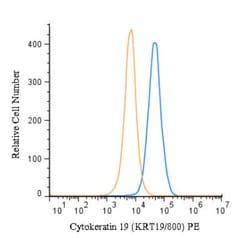Cyclin D1 Antibody (CCND1/809) - Azide and BSA Free, Novus Biologicals™
Mouse Monoclonal Antibody
Manufacturer: Fischer Scientific
The price for this product is unavailable. Please request a quote
Antigen
Cyclin D1
Concentration
1.0 mg/mL
Applications
Western Blot, Flow Cytometry, Immunohistochemistry (Paraffin), Immunofluorescence, CyTOF
Conjugate
Unconjugated
Host Species
Mouse
Research Discipline
Cancer, Cell Cycle and Replication, Core ESC Like Genes, mTOR Pathway, Stem Cell Markers, Wnt Signaling Pathway
Formulation
PBS with No Preservative
Gene ID (Entrez)
595
Immunogen
Recombinant human CCND1 protein
Primary or Secondary
Primary
Content And Storage
Store at 4C short term. Aliquot and store at -20C long term. Avoid freeze-thaw cycles.
Molecular Weight of Antigen
36 kDa
Clone
CCND1/809
Dilution
Western Blot : 0.5 - 1.0 ug/ml, Flow Cytometry : 0.5 - 1 ug/million cells in 0.1 ml, Immunohistochemistry-Paraffin : 0.5 - 1.0 ug/ml, Immunofluorescence : 1 - 2 ug/ml, CyTOF-ready
Classification
Monoclonal
Form
Purified
Regulatory Status
RUO
Target Species
Human
Gene Alias
B-cell lymphoma 1 protein, BCL-1, BCL-1 oncogene, BCL1D11S287E, cyclin D1, cyclin D1 (PRAD1: parathyroid adenomatosis 1), G1/S-specific cyclin D1, G1/S-specific cyclin-D1, PRAD1 oncogene, PRAD1B-cell CLL/lymphoma 1, U21B31
Gene Symbols
CCND1
Isotype
IgG2a κ
Purification Method
Protein A or G purified
Test Specificity
Recognizes a protein of 36kDa, identified as cyclin D1. Cyclin D1, one of the key cell cycle regulators, is a putative proto-oncogene overexpressed in a wide variety of human neoplasms. This antibody neutralizes the activity of cyclin D1 in vivo. About 60% of mantle cell lymphomas (MCL) contain a t(11; 14)(q13; q32) translocation resulting in over-expression of cyclin D1. This antibody is useful in identifying mantle cell lymphomas (cyclin D1 positive) from CLL/SLL and follicular lymphomas (cyclin D1 negative). Occasionally, hairy cell leukemia and plasma cell myeloma weakly express Cyclin D1.
Description
- Cyclin D1 Monoclonal specifically detects Cyclin D1 in Human samples
- It is validated for Flow Cytometry, Immunohistochemistry, Immunohistochemistry-Paraffin, CyTOF-ready.


